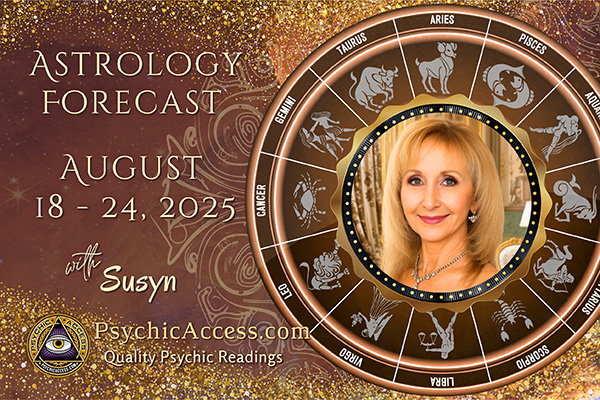Weekly Astrology Forecasts for August 18 – 24, 2025
 The week kicks off with the Moon still residing in inquisitive Gemini this morning*, allowing us to ease into Monday filled with discussions, ideas, and intellectual engagement. Yet while the day initiates in a light and chatty manner, it tends to grow more emotional as it progresses.
The week kicks off with the Moon still residing in inquisitive Gemini this morning*, allowing us to ease into Monday filled with discussions, ideas, and intellectual engagement. Yet while the day initiates in a light and chatty manner, it tends to grow more emotional as it progresses.
An early sextile with the Sun in Leo enhances our self-assurance and creative vigor. You may feel motivated to express what’s on your heart or mind.
By late morning, a sextile between the Moon and Chiron in Aries facilitates conversations about issues that have been troubling you. This is an opportune moment for healing through sincere dialogue or providing support to someone facing difficulties.
In the afternoon, the Moon transitions into Cancer, raising emotional intensity for the next several days. This lunar sign emphasizes feelings, domestic life, and intimate relationships.
Shortly after the Moon changes signs, it squares with both Saturn and Neptune in Aries, stirring up feelings of pressure or uncertainty.
You may find yourself caught between what your heart desires and what you must accomplish. Later in the evening, a quincunx with Pluto in Aquarius may evoke strong emotions or highlight a need to release something that is no longer beneficial.
Take a moment today to recognize your feelings and what your body and heart are craving. Engaging in self-care, seeking comfort, and having honest discussions will be very beneficial today.
Tuesday, August 19: Heartfelt Expansion
Anticipate warm and uplifting vibes. This day radiates positive energy. Emotions flow with ease, fostering support for heart-centered connections. Allow yourself to be open and generous, as this is likely to be reciprocated.
The Sun in Leo trines Chiron in Aries, providing healing through self-confidence and creativity. It’s an excellent day to practice kindness toward yourself and others, especially if you are navigating something emotionally delicate.
In the evening, the Cancer Moon meets generous Jupiter in Cancer, prompting us to show love, compassion, and understanding to ourselves and others. It’s an ideal night for sharing a meal, reaching out to family, or simply enjoying a cozy evening at home.
Wednesday, August 20: Creative Warmth
Today combines emotion with creativity. It begins softly and tenderly, shifting to a more playful and confident atmosphere by evening. Let the day be about honoring your feelings while embracing joy. The Moon remains in Cancer for most of the day, establishing a comforting and nurturing environment.
A morning conjunction between the Moon and Venus in Cancer alleviates any tension and promotes emotional harmony. This is a great time for deep conversations or simply doing something nice for someone you care about.
As midday arrives, a creative quintile between the Moon and Mars in Libra provides the motivation needed for gentle action, particularly in relationships or artistic endeavors. However, a few hours later, a square between the Moon and Chiron in Aries may unearth old wounds or self-doubt. Exercise compassion for yourself and others if emotions feel heightened.
As evening falls, the Moon enters Leo, prompting a shift in vibe. Things become lighter, more expressive, and more fun. The following couple of days are perfect for celebrating joy and self-expression.
Thursday, August 21: Joyful Generosity
It’s a vibrant day filled with creative energy and self-assurance. Share your brilliance, voice your truth, and embrace standing out. It’s a wonderful day to be noticed and heard.
With the Moon in Leo, the atmosphere is lively, bold, and generous. Early in the day, the lunar sextile with Mars in Libra encourages us to act confidently in our relationships and creative pursuits. This is an ideal day to follow your inspiration.
Later in the afternoon, the Moon aligns with Mercury in Leo, enhancing our ability to articulate ourselves clearly and with style. You might find yourself having important discussions, posting on social media, or sharing heartfelt messages.
Friday, August 22: Grounded Shift
Today combines creativity with groundedness. Dedicate some time to finalize playful Leo-season projects and begin considering how you wish to enhance and organize your life in the upcoming weeks.
The cosmos indicates a turning point as the Sun leaves passionate Leo and enters contemplative Virgo today. Over the next four weeks, our attention will shift toward routines, health, organization, and service. You may already feel the desire to tidy your space, create lists, or recommit to healthy habits.
The Leo Moon lingers until early Saturday, so you might still experience some of that vibrant energy today, but by this evening, practicality will begin to take precedence.
Saturday, August 23: Discipline Dawn
Today is ideal for setting intentions and getting organized. Trust your inner voice and jot down any ideas that come to you spontaneously. They could be exactly what you need for progress.
The Moon enters Virgo just after midnight, joining the Sun to commence a new lunar cycle. This New Moon offers strong support for cultivating new habits, organizing your space, or setting intentions focused on health and daily routines.
By mid-morning, the Moon creates a quintile with Lilith in Scorpio, adding an element of empowerment and intrigue. Later in the day, Mercury in Leo quintiles Uranus in Gemini, igniting sparks that may lead to sudden insights, unexpected conversations, or fresh ideas. If you’ve been longing for mental clarity or inspiration, it might just strike unexpectedly.
Sunday, August 24: Social Refinement
The day is set to be laid-back yet meaningful. Allocate time to connect with others while also paying attention to finer details. Balance structure with gentleness, and observe what brings serenity to your spirit.
The Virgo Moon forms two sextiles early in the day with Jupiter in Cancer, followed soon after with Lilith in Scorpio. These alignments foster emotional equilibrium, practical wisdom, and perhaps a deeper connection in your discussions. Whether you’re reconnecting with friends, cleaning your space, or posting online, you’ll likely feel centered and supported.
Later in the morning, an opposition between the Moon and the North Node in Pisces might create a moment of strain or contemplation. You may feel torn between maintaining order and flowing freely. Take a moment to reflect on your deeper spiritual journey.
* All aspect and transit times are in Eastern Time (New York City, NY, USA). Please adjust accordingly for your local time zone.
|
Residing in New Mexico, Susyn offers Psychic Guidance, Astrological Insights, and Channeled Messages that can transform your life! With top-notch credentials including a doctorate in metaphysical studies and certifications from The American Association of Professional Psychics and The American Tarot Guild, she’s also a published author with two metaphysical books and numerous articles and horoscope columns. Along with her readings, Susyn is a mentoring practitioner who teaches others how to harness their gifts, elevate their vibrations, and empower themselves. A sought-after guest on various radio shows, she has also hosted her own radio program. If you’re searching for an authentic star who can also read them with staggering accuracy, your search ends here. You can find Susyn at PsychicAccess.com. |
As we step into the third week of August 2025, the celestial bodies are aligning to usher in substantial changes and opportunities in our lives. Let’s explore what the universe has in store for us with our weekly astrology forecasts for August 18 – 24.
Aries (March 21 – April 19): This week, Aries, you may experience a boost in assertiveness and confidence in your actions. Trust your intuition and take daring steps toward your ambitions. The Full Moon on August 20th will clarify a situation that has been perplexing.
Taurus (April 20 – May 20): Taurus, this week revolves around communication and connection. Reach out to old friends or colleagues and reinforce your relationships. The New Moon on August 18th will encourage you to establish new intentions for your personal growth and development.
Gemini (May 21 – June 20): Gemini, expect a wave of creativity and inspiration this week. Harness this energy to chase your artistic passions or initiate a new venture. The Sun’s entry into Virgo on August 23rd will instill a sense of stability and grounding in your life.
Cancer (June 21 – July 22): Concentrate on self-care and nurturing your emotional health this week, Cancer. Take time to relax and rejuvenate, prioritizing your own needs. The Mercury-Jupiter trine on August 21st will present opportunities for advancement and expansion in your career.
Leo (July 23 – August 22): This week is about taking chances and stepping beyond your comfort zone, Leo. Embrace the changes and remain open to new opportunities. The Venus-Pluto opposition on August 24th could introduce some relationship challenges, but trust the process will lead to growth and transformation.
Virgo (August 23 – September 22): This week evokes a period of contemplation and introspection for Virgo. Step back and assess your goals and priorities. The Full Moon on August 20th will provide clarity regarding a confusing situation.
Libra (September 23 – October 22): Focus on balance and harmony within your relationships this week, Libra. Prioritize communication and compromise to strengthen your connections. The New Moon on August 18th will encourage you to establish new intentions for your personal growth and development.
Scorpio (October 23 – November 21): This week could bring unexpected changes and challenges for Scorpio. Maintain flexibility and adaptability in your responses to these situations. The Sun’s transition into Virgo on August 23rd will foster a sense of stability and grounding.
Sagittarius (November 22 – December 21): Embrace adventure and exploration this week, Sagittarius. Seek new opportunities and experiences. The Mercury-Jupiter trine on August 21st will yield opportunities for advancement and expansion in your career.
Capricorn (December 22 – January 19): This week underscores the importance of establishing boundaries and prioritizing your own needs, Capricorn. Take the time to rejuvenate and focus on self-care. The Venus-Pluto opposition on August 24th might present relationship challenges, but trust that they will lead to growth and transformation.
Aquarius (January 20 – February 18): Innovation and creativity are highlighted this week for Aquarius. Trust your instincts and employ unconventional strategies to address issues. The Full Moon on August 20th will provide clarity related to a perplexing situation.
Pisces (February 19 – March 20): Intuition and spiritual growth take center stage this week, Pisces. Rely on your inner guidance and remain attentive to your dreams and instincts. The New Moon on August 18th will incentivize you to set new intentions for your personal growth and development.
In summary, this week fosters growth, transformation, and change for all zodiac signs. Embrace the opportunities that arrive and trust that the universe has a plan for you. Be open to new experiences and willing to venture beyond your comfort zone. Remember, the stars are perpetually guiding you on your journey. Continue reading















